1. Overview
Peter Michael Falk (September 16, 1927 - June 23, 2011) was an American actor, singer, television director, and producer. He is widely celebrated for his iconic portrayal of Lieutenant Columbo in the long-running television series Columbo (1968-1978, 1989-2003), a role that earned him four Primetime Emmy Awards and a Golden Globe Award. Falk's artistic integrity and distinctive acting style, characterized by his rumpled appearance and unique mannerisms, made Columbo a globally recognized cultural figure. Beyond this defining role, Falk demonstrated remarkable versatility across film and television, earning two Academy Award nominations for his supporting performances in Murder, Inc. (1960) and Pocketful of Miracles (1961). His collaborations with independent filmmaker John Cassavetes further showcased his depth as an actor. Throughout his career, Falk left an indelible mark on the entertainment industry, culminating in a posthumous star on the Hollywood Walk of Fame in 2013. His legacy extends beyond his acting, influencing legal protections for incapacitated individuals through "Peter Falk's Law," which reflects a societal concern for familial bonds and legal rights.
2. Early Life
Peter Falk's early life was marked by significant personal challenges and a diverse educational and professional background that shaped his resilience and unique perspective before he embarked on his acting career.
2.1. Birth and Family Background
Peter Michael Falk was born on September 16, 1927, in The Bronx, New York City. He was the son of Michael Peter Falk, who owned a clothing and dry goods store, and Madeline (née Hochhauser). Both of Falk's parents were Jewish; his father was of Russian-Jewish descent, and his mother had Polish, Czech, and Hungarian-Jewish (Ashkenazim) heritage. He grew up in Ossining, Westchester County, New York.
2.2. Vision Issues and Childhood
At the age of three, Falk was diagnosed with retinoblastoma, a rare form of eye cancer, which necessitated the surgical removal of his right eye. For the majority of his life, he wore an artificial eye, which contributed to his distinctive squint. Despite this physical challenge, Falk actively participated in team sports during his childhood, particularly baseball and basketball. He was known for his resilience and humor regarding his condition. In a 1997 interview with Cigar Aficionado magazine, Falk famously recounted an incident during a high school baseball game: when an umpire called him out at third base, he removed his glass eye, handed it to the umpire, and quipped, "Try this." This anecdote highlights his ability to turn a personal challenge into a source of humor and connection with others. Falk's first stage appearance was at age 12 in The Pirates of Penzance at Camp High Point in upstate New York, where one of his camp counselors was Ross Martin. He attended Ossining High School, where he was a star athlete and served as president of his senior class, graduating in 1945.

2.3. Education
Falk's academic journey was varied and extensive. He briefly attended Hamilton College in Clinton, New York. Following his service in the Merchant Marine, he returned to Hamilton College and also studied at the University of Wisconsin. He later transferred to The New School for Social Research in New York City, where he earned a bachelor's degree in literature and political science in 1951. Continuing his education, Falk enrolled at Syracuse University, ultimately obtaining a Master of Public Administration degree from the Maxwell School of Syracuse University in 1953. This program was designed to train civil servants for the federal government, a career path Falk later admitted he had "no interest in and no aptitude for."
2.4. Merchant Marine Service and Early Experiences
As World War II was nearing its end, Falk attempted to join the armed services but was rejected due to his missing eye. He subsequently joined the United States Merchant Marine, serving for a year and a half as a cook and mess boy. Reflecting on this experience in 1997, Falk humorously remarked, "There they don't care if you're blind or not. The only one on a ship who has to see is the captain. And in the case of the Titanic, he couldn't see very well, either." After his time in the Merchant Marine, Falk traveled extensively in Europe, including working on a railroad in Yugoslavia for six months. He also considered joining the fight in Israel against Egypt but the war ended before his ship sailed. Prior to pursuing acting, he applied for a job with the CIA but was rejected due to his mandatory membership in the Marine Cooks and Stewards Union during his Merchant Marine service, a union that had faced scrutiny for alleged communist leanings. He then worked as a management analyst for the Connecticut State Budget Bureau in Hartford, a role he characterized as an "efficiency expert," humorously noting that his tendency to be late, which was ironic for an efficiency expert, ultimately led him to acting.
3. Acting Career Beginnings
Peter Falk's acting career began with a strong foundation in theater, gradually transitioning to film and television where he quickly made a name for himself despite initial challenges.
3.1. Stage Career
While working in Hartford, Falk joined a local community theater group known as the Mark Twain Masquers, performing in productions such as The Caine Mutiny Court-Martial, The Crucible, and The Country Girl by Clifford Odets. He also sought formal training, studying with the renowned actress and director Eva Le Gallienne at the White Barn Theatre in Westport. Falk later admitted to "lying his way" into her class, which was intended for professional actors. He would drive from Hartford every Wednesday, often arriving late. When Le Gallienne questioned his tardiness and profession, Falk confessed he was not a professional actor. Her response, "Well, you should be," served as a pivotal moment, prompting him to quit his job and move to Greenwich Village in 1956 to fully pursue acting.

His first New York stage role was in an off-Broadway production of Molière's Don Juan at the Fourth Street Theatre in January 1956, which closed after a single performance. However, his next role proved more impactful: in May, he appeared as Rocky Pioggi in a revival of The Iceman Cometh at Circle in the Square, directed by Jose Quintero and starring Jason Robards. Later in 1956, Falk made his Broadway debut in Alexander Ostrovsky's Diary of a Scoundrel, followed by an appearance in Shaw's Saint Joan with Siobhán McKenna. He continued to perform in summer stock theater, including a 1962 staging of Arnold Schulman's A Hole in the Head.
In 1972, Falk appeared in Broadway's The Prisoner of Second Avenue. While critics noted that his "squinty gaze, the result of the loss of an eye," added authenticity to his characters, this production caused Falk considerable stress. He struggled with memorizing lines and experienced an anxiety attack during rehearsals. This experience, coupled with his growing preference for film and television, led him to avoid further stage performances.
3.2. Early Film Career
Despite his success on stage, Falk faced initial resistance in Hollywood due to his artificial eye. A theatrical agent advised him not to expect much film work, and Columbia Pictures studio boss Harry Cohn famously told him, "For the same price I can get an actor with two eyes." He also failed to secure a role in the film Marjorie Morningstar. His early film appearances were in small roles in Wind Across the Everglades (1958), The Bloody Brood (1959), and Pretty Boy Floyd (1960).

A turning point came with his performance in Murder, Inc. (1960), where he played the supporting role of killer Abe Reles, a character based on a real-life gangster. The New York Times film critic Bosley Crowther praised Falk's "amusingly vicious performance," noting how his weary demeanor and squinty gaze could suddenly transform into terrifying viciousness. Falk himself described his casting in the film as a "miracle" that "made my career," leading to other significant movie roles. He was nominated for an Academy Award for Best Supporting Actor for this role.
In 1961, legendary director Frank Capra cast Falk in the comedy Pocketful of Miracles, Capra's final feature film. Although the film was not a commercial success, Capra was effusive in his praise for Falk's performance, calling him "my joy, my anchor to reality" and crediting him with making him "forget pains, tired blood." Falk, in turn, lauded Capra's enjoyment of actors and the acting craft, recalling how Capra once reshot a scene simply because he loved it so much and wanted to see them perform it again. This role earned Falk his second consecutive Academy Award nomination.

Throughout the remainder of the 1960s, Falk primarily took on supporting roles in films and guest appearances on television. Notable film roles included one of the cab drivers in the star-studded 1963 comedy It's a Mad, Mad, Mad, Mad World, Guy Gisborne in the Rat Pack musical comedy Robin and the 7 Hoods (1964), where he also sang, and Maximilian Meen in the spoof The Great Race (1965) alongside Jack Lemmon and Tony Curtis.
3.3. Early Television Career
Falk's television career began in 1957, during the period known as the "Golden Age of Television," with appearances in dramatic anthology programs like Robert Montgomery Presents, Studio One, and Kraft Television Theater. He also appeared in crime dramas such as New York Confidential, Naked City, The Untouchables, Have Gun-Will Travel, The Islanders, and Decoy.
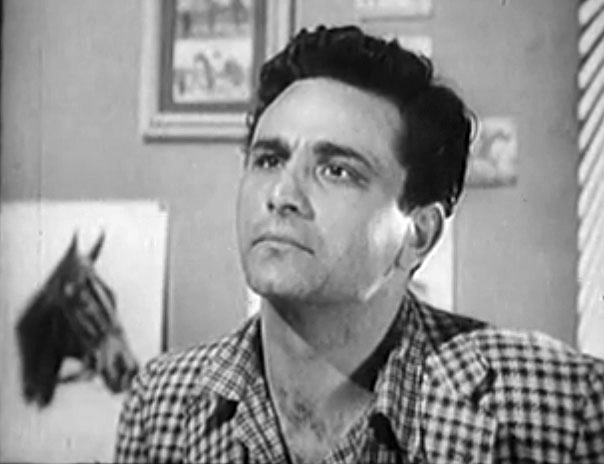
In the early 1960s, Falk often portrayed unsavory characters on television. He starred as a paranoid, Castro-type revolutionary in The Twilight Zone episode "The Mirror," who, intoxicated with power, begins seeing would-be assassins in a mirror. He also appeared in two of Alfred Hitchcock's television series: as a gangster terrified of death in a 1961 episode of Alfred Hitchcock Presents and as a homicidal evangelist in 1962's The Alfred Hitchcock Hour.
In 1961, Falk received an Emmy Award nomination for his performance in the episode "Cold Turkey" of James Whitmore's series The Law and Mr. Jones. He then won his first Emmy Award in 1962 for "The Price of Tomatoes," a drama featured on The Dick Powell Show. Notably, Falk became the first actor to be nominated for both an Academy Award and an Emmy Award in the same year, achieving this feat twice: in 1961 for Murder, Inc. and The Law and Mr. Jones, and again in 1962 for Pocketful of Miracles and The Dick Powell Show, winning the latter.
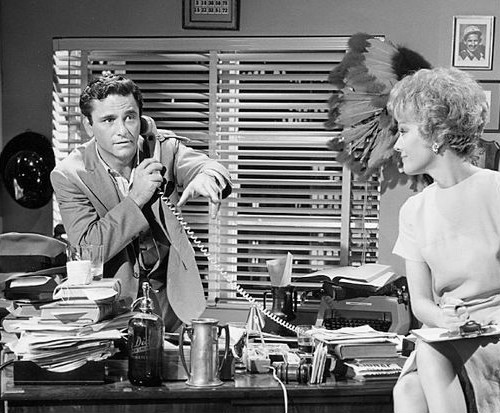
In 1963, Falk and Tommy Sands guest-starred in "The Gus Morgan Story" on Wagon Train, playing brothers who disagreed on a railroad route. Falk's first lead role in a television series came with CBS's The Trials of O'Brien, which ran from 1965 to 1966. In its 22 episodes, Falk played Daniel O'Brien, a Shakespeare-quoting lawyer who defended clients while solving mysteries. In 1966, he also co-starred in a television production of Brigadoon with Robert Goulet.
In 1971, Falk assisted Pierre Cossette in producing the first Grammy Awards show on television, with Cossette later crediting Falk for "saving my ass."
4. The Role of Columbo
The role of Lieutenant Columbo became the defining character of Peter Falk's career, earning him widespread acclaim and cementing his legacy as a television icon.
4.1. Character and Series Overview
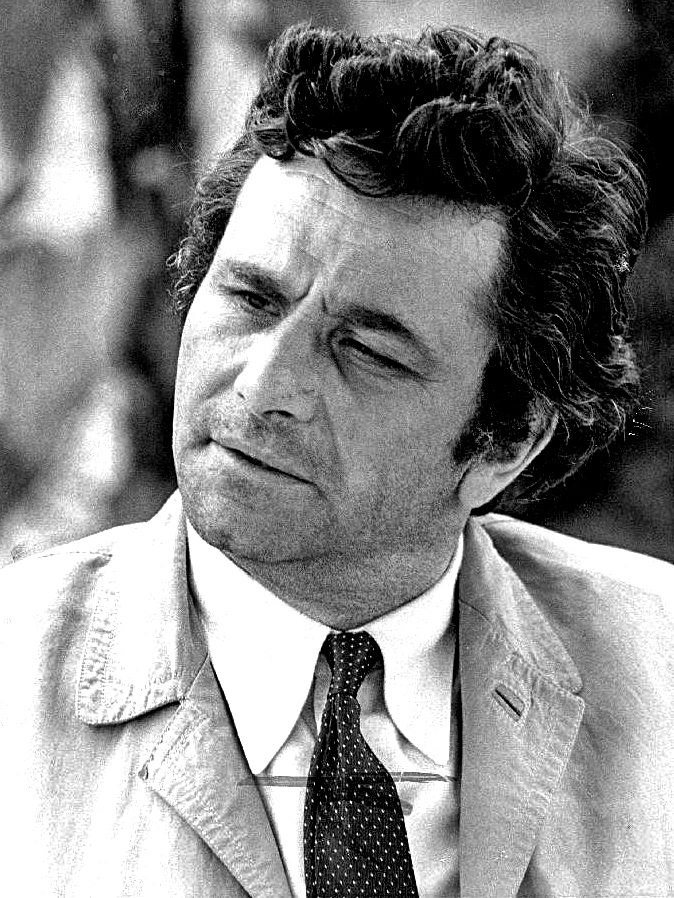
Peter Falk is best known for his portrayal of Lieutenant Columbo, described as "everyone's favorite rumpled television detective." The character, created by William Link and Richard Levinson, first appeared in the 1968 TV movie Prescription: Murder. Columbo's distinctive appearance included a shabby raincoat (which was Falk's own), high-topped shoes, and a disheveled demeanor. His mannerisms often involved a deceptively absent-minded approach, fumbling through pockets, asking to borrow pencils, and getting distracted by irrelevant details, all designed to keep suspects off-balance and elicit genuine reactions from his fellow actors. His most famous catchphrase was "Just one more thing," which originated when Link and Levinson needed to extend a scene in the original play and simply had Columbo return after his exit.
The Columbo series employed a unique inverted detective story format, typically revealing the murderer at the beginning of the episode and then showing how the Los Angeles homicide detective meticulously solved the crime. Falk described Columbo as an "ass-backwards Sherlock Holmes," noting Holmes's long neck versus Columbo's lack thereof, and Holmes's pipe versus Columbo's habit of chewing six cigars a day. Television critic Ben Falk suggested the character was "apparently inspired by Dostoyevsky's dogged police inspector, Porfiry Petrovich, in the novel Crime and Punishment." Falk himself saw a correlation between his own personality and Columbo's, stating, "I'm a Virgo Jew, and that means I have an obsessive thoroughness. It's not enough to get most of the details; it's necessary to get them all. I've been accused of perfectionism."
The series achieved enduring global popularity, with Falk expressing "general amazement" at its reach, recalling how children in remote African villages would recognize him and shout, "Columbo, Columbo!" The show also featured Columbo's Basset Hound named Dog, which Falk initially resisted as "another gimmick" but later embraced, believing Dog "was exactly the type of dog that Columbo would own." Dog made his first appearance in the 1972 episode "Étude In Black." The children's song "This Old Man" became the show's unofficial signature tune, introduced in the 1973 episode "Any Old Port in a Storm," with Columbo often heard humming or whistling it. Falk admitted he simply enjoyed the melody, and it naturally became part of the character.
4.2. Awards and Critical Reception
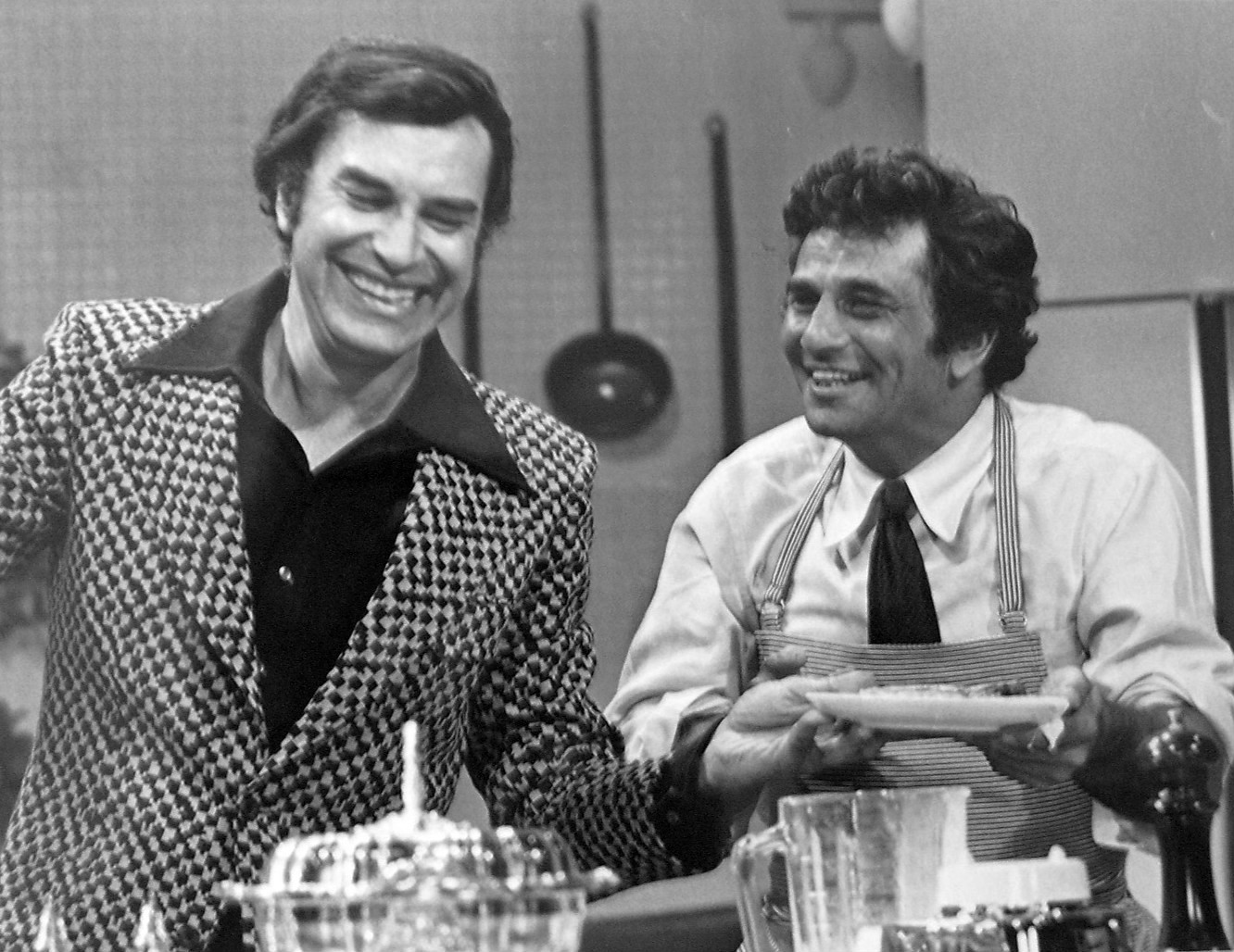
Peter Falk received immense critical acclaim and numerous awards for his portrayal of Lieutenant Columbo. He won four Primetime Emmy Awards for Outstanding Lead Actor in a Drama Series for his work on Columbo in 1972, 1975, 1976, and 1990. Additionally, he received a Golden Globe Award for Best Actor in a Television Series - Drama in 1973 for the role.
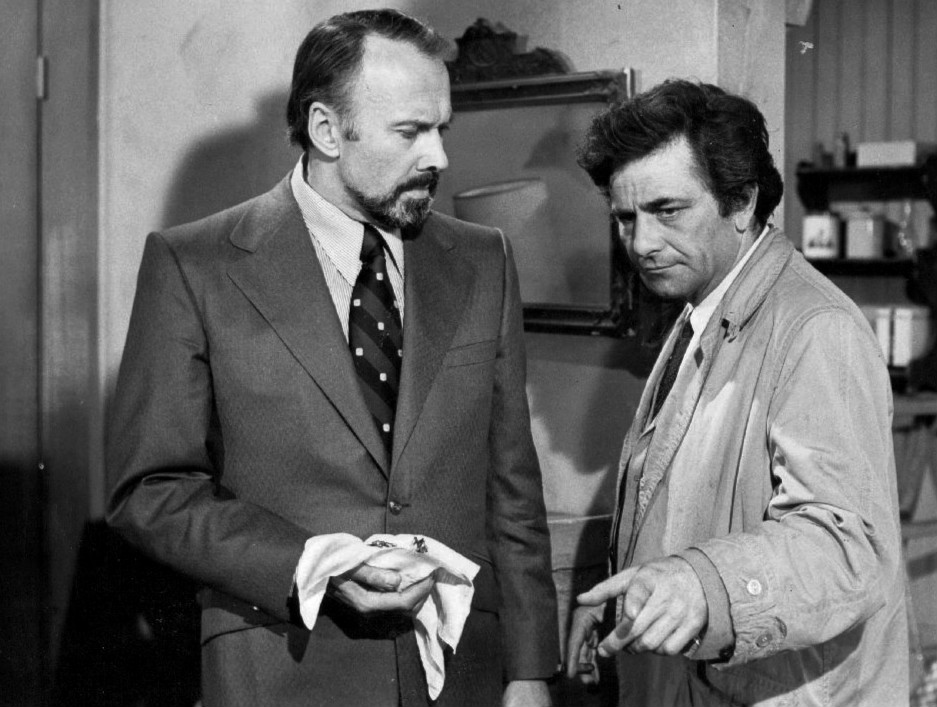
The series itself garnered significant recognition. In 1997, TV Guide ranked the Columbo episode "Murder by the Book" at No. 16 on its '100 Greatest Episodes of All Time' list. Two years later, the magazine ranked Lieutenant Columbo as No. 7 on its '50 Greatest TV Characters of All Time' list, solidifying his status as an iconic figure in television history.
4.3. Production Notes and Impact
Falk's personal involvement in shaping the character of Columbo and his creative contributions extended beyond acting. He provided his own wardrobe for the character, including the high-topped shoes and the famous shabby raincoat, which first appeared in Prescription: Murder. Falk frequently used ad-libbing to enhance his performance and keep his fellow actors on their toes, believing it helped make their confused and impatient reactions to Columbo's eccentricities more genuine.
The series had a significant impact on television storytelling. The first episode of Columbo as a regular series in 1971 was directed by a then 24-year-old Steven Spielberg, in one of his earliest directing jobs. Falk recognized Spielberg's talent early on, telling producers, "This guy is too good for Columbo." Spielberg, for his part, later stated, "I learned more about acting from him at that early stage of my career than I had from anyone else."
While Falk primarily starred as Columbo, the character had been previously played by Bert Freed in a 1960 television episode of The Chevy Mystery Show ("Enough Rope") and by Thomas Mitchell on Broadway. Mitchell's death led to Falk taking on the role, which he reprised in the 1970 pilot Ransom for a Dead Man. Columbo aired regularly on NBC as part of the NBC Mystery Movie from 1971 to 1978, with episodes typically running 90 or 120 minutes. The show then returned on ABC as a series of less frequent TV movies from 1989 until 2003.
Falk directed only one episode of the series, "Blueprint for Murder" in 1971, though it is rumored he and John Cassavetes were largely responsible for the direction of "Étude in Black" in 1972. Falk's favorite Columbo episodes included "Any Old Port in a Storm," "Forgotten Lady," "Now You See Him," and "Identity Crisis." The show's immense popularity translated into substantial earnings for Falk, with rumors suggesting he earned 300.00 K USD per episode when he returned for Season 6 in 1976, which reportedly doubled to 600.00 K USD per episode when the series made its comeback in 1989. The success of Columbo also led co-creator William Link to write a series of short stories, The Columbo Collection, which included a drawing by Falk of himself as Columbo.
A few years before his death, Falk expressed interest in reprising the role one last time, selecting a script titled "Columbo: Hear No Evil" (later renamed "Columbo's Last Case"). However, ABC declined the project, and efforts to shop it to foreign production companies were halted by Falk's diagnosis with dementia in late 2007.
5. Major Film and Television Work
Beyond his iconic role as Columbo, Peter Falk built a diverse career in both film and television, showcasing his range and versatility through collaborations with notable directors and a variety of character portrayals.
5.1. Collaborations with John Cassavetes
Peter Falk maintained a close personal and artistic friendship with independent filmmaker John Cassavetes. This collaboration resulted in some of Falk's most critically acclaimed performances. He starred in Cassavetes' films Husbands (1970), A Woman Under the Influence (1974), and made a cameo appearance at the end of Opening Night. Cassavetes, in turn, guest-starred in the Columbo episode "Étude in Black" in 1972. Falk also co-starred with Cassavetes in Elaine May's film Mikey and Nicky (1976).
Falk often spoke about his experiences working with Cassavetes, particularly his unconventional directing strategies. Cassavetes was known for shooting actors when they were unaware the camera was rolling and for not strictly adhering to "Stop. Cut. Start again." Falk recalled, "John would walk in the middle of a scene and talk, and though you didn't realize it, the camera kept going. So I never knew what the hell he was doing. But he ultimately made me, and I think every actor, less self-conscious, less aware of the camera than anybody I've ever worked with." These collaborations allowed Falk to explore more serious and nuanced dramatic roles, contrasting with his more comedic or detective-oriented work.
5.2. Other Film Appearances
Falk continued to work prolifically in film throughout his career. In 1978, he appeared in William Friedkin's film The Brink's Job, with Friedkin praising Falk's "great range from comedy to drama. He could break your heart or he could make you laugh." Falk also starred as an ex-CIA officer of questionable sanity in the comedy The In-Laws. Director Arthur Hiller noted that the film originated from Alan Arkin and Peter Falk's desire to work together, and it became one of his most commented-on films. Critic Roger Ebert highlighted the strong chemistry between Falk and Arkin, describing Falk's "deadpan lecturer mode, slowly and patiently explaining things that sound like utter nonsense."
Other notable film appearances include:
- The Great Muppet Caper (1981) as a tramp.
- The Princess Bride (1987) as the beloved Grandfather/Narrator, a role that showcased his warm, storytelling side.
- Murder by Death (1976) and The Cheap Detective (1978), where he played comedic detective roles.
- Vibes (1988), a supernatural comedy.
- Made (2001), a crime comedy.
- Wings of Desire (1987) and its 1993 sequel, Faraway, So Close!, directed by Wim Wenders. In these German-language films, Falk played a semi-fictionalized version of himself, a famous American actor who was once an angel but chose to become human to experience life fully. He described the role as "the craziest thing that I've ever been offered" and earned critical acclaim for his supporting performance. In Wings of Desire, there is a scene where Falk sketches extras, and in Faraway, So Close!, he is shown opening an exhibition of his paintings, humorously self-deprecating his art.
- The Thing About My Folks (2005), a family comedy-drama. Roger Ebert, while not impressed with other aspects of the film, praised Falk, writing: "...We discover once again what a warm and engaging actor Peter Falk is. I can't recommend the movie, but I can be grateful that I saw it, for Falk."
- Next (2007) with Nicolas Cage.
- American Cowslip (2009), his final film role.
5.3. Other Television Appearances
Beyond Columbo, Falk had a prolific television career, starring in numerous series and made-for-television movies. His first lead in a television series was in CBS's The Trials of O'Brien (1965-1966), where he played a Shakespeare-quoting lawyer. He also co-starred in a television production of Brigadoon in 1966.
In 1978, Falk appeared on The Dean Martin Celebrity Roast, portraying his Columbo character to "roast" Frank Sinatra. Later in his career, he starred in a trilogy of holiday television movies: A Town Without Christmas (2001), Finding John Christmas (2003), and When Angels Come to Town (2004), in which he played Max, a quirky guardian angel who used disguises and subterfuge to guide his charges. He also appeared in The Lost World (2001) and Wilder Days (2003), where he began to take on roles as a stubborn yet human patriarch in family dramas.
Falk also had a connection to Japanese television, appearing in commercials for Suntory Royal whiskey ("Peter's Bar" series) and Toyota Corolla cars in the 1990s, where he often used his "Just one more thing" catchphrase, though his voice was dubbed in Japanese by 石田太郎Taro IshidaJapanese.
6. Personal Life
Peter Falk's personal life included two marriages, adopted daughters, and a passion for artistic pursuits beyond acting.
6.1. Marriage and Family
Falk married his college sweetheart, Alyce Mayo, on April 17, 1960. The couple adopted two daughters, Catherine and Jackie. Catherine Falk later became a private investigator. Peter Falk and Alyce Mayo divorced in 1976. On December 7, 1977, he married actress Shera Danese, whom he had met on the set of Columbo. Danese guest-starred in more episodes of the Columbo series than any other actress. Falk did not have any biological children. His niece, Samantha Falk, is also an actress.
6.2. Artistic Pursuits and Hobbies
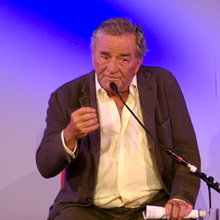
Beyond his acting career, Peter Falk was an accomplished visual artist. He took classes at the Art Students League of New York for many years and was known for his drawings, particularly still life and portraits, though he also explored modern art with bold, abstract pieces. In October 2006, he had an exhibition of his drawings at the Butler Institute of American Art. He also had several exhibitions of his sketches in Japan. His artwork was sometimes featured in his films, and his official website allowed fans to view and purchase his pieces.
Falk was also a dedicated chess enthusiast. He was a spectator at the American Open in Santa Monica, California, in November 1972, and at the U.S. Open in Pasadena, California, in August 1983.
His autobiography, Just One More Thing, was published in 2006.
7. Health Issues and Later Life
Peter Falk's later years were marked by significant health challenges, particularly his struggle with Alzheimer's disease, which led to a legal battle that ultimately inspired new legislation to protect family rights.
7.1. Health Deterioration and Conservatorship
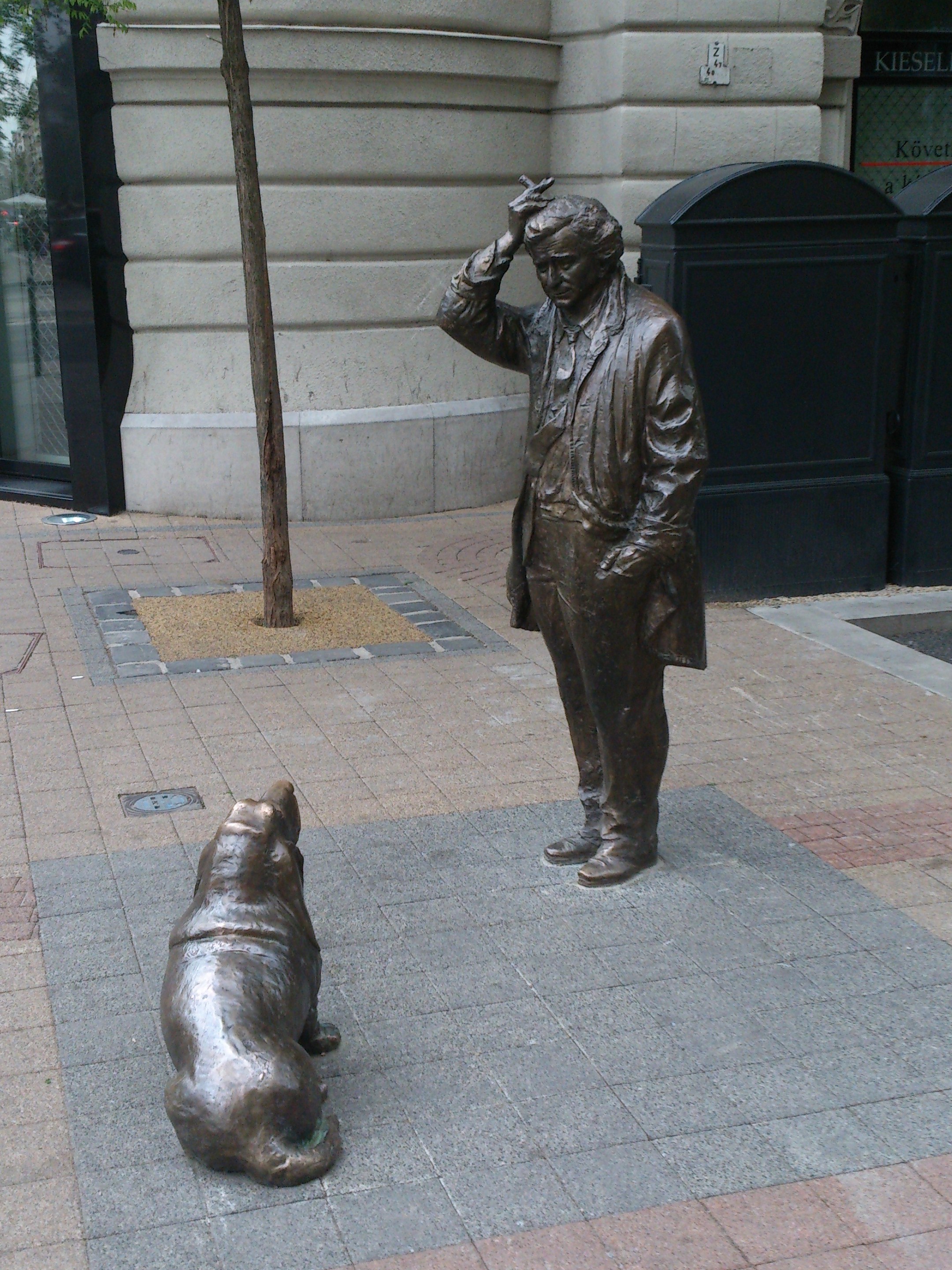
In December 2008, it was publicly reported that Peter Falk had been diagnosed with Alzheimer's disease. During a two-day conservatorship trial in Los Angeles in June 2009, Dr. Stephen Read, one of Falk's personal physicians, testified that Falk's condition had rapidly deteriorated into dementia following a series of dental operations in 2007. Dr. Read noted that it was unclear whether the worsening of his condition was a direct result of the anesthesia or another reaction to the procedures. Following the trial, Falk's second wife, Shera Danese Falk, was appointed as his conservator. Reports from this period indicated that Falk's memory had declined to the point where he no longer remembered his iconic role as Columbo.
7.2. "Peter Falk's Law"
The circumstances surrounding Peter Falk's conservatorship and the alleged restrictions on family visitation led to a significant legislative effort. According to his daughter, Catherine Falk, Shera Danese Falk, as conservator, allegedly prevented some of Falk's family members from visiting him, failed to notify them of major changes in his condition, and did not inform them of his death or funeral arrangements.
In response to these issues, Catherine Falk advocated for and encouraged the passage of legislation colloquially known as "Peter Falk's Law." This new law, enacted in New York State in 2015, aims to protect the visitation and communication rights of adult children with their incapacitated parents. It provides guidelines that guardians or conservators must follow regarding family visitation rights and notification of significant medical and end-of-life developments. New York State Senator John DeFrancisco, in introducing the measure, stated, "For every wrong there should be a remedy. This bill gives a remedy to children of elderly and infirm parents who have been cut off from receiving information about their parents. It also gives them an avenue through the courts to obtain visitation rights with the parents." As of 2020, more than fifteen states in the United States had enacted similar laws, reflecting a growing concern for familial bonds and legal protections for incapacitated individuals and their families.
8. Death and Remembrance
Peter Falk's death marked the end of an era for many fans, prompting widespread tributes and solidifying his enduring legacy in the entertainment world.
8.1. Death Process and Cause
On the evening of June 23, 2011, Peter Falk died peacefully at his longtime home on Roxbury Drive in Beverly Hills. He was 83 years old. The official causes of death were pneumonia and complications from Alzheimer's disease. His daughters publicly stated that they would remember his "wisdom and humor." Falk was buried at Westwood Village Memorial Park Cemetery in Los Angeles, California. His epitaph reads: "I'm not here, I'm home with Shera."
8.2. Tributes and Legacy

Falk's passing was met with numerous tributes from colleagues, directors, and friends across the entertainment industry. Celebrities such as Jonah Hill and Stephen Fry expressed their condolences. Director Steven Spielberg, who directed an early Columbo episode, stated, "I learned more about acting from him at that early stage of my career than I had from anyone else." Director Rob Reiner praised Falk as "a completely unique actor," highlighting his work with Alan Arkin in The In-Laws as "one of the most brilliant comedy pairings we've seen on screen."
Peter Falk's significant contributions to acting and his lasting impact were further recognized posthumously. In 2013, he received a star on the Hollywood Walk of Fame, a recognition that had been decided in 1991 but not formally installed until after his death. His portrayal of Lieutenant Columbo remains one of the most iconic characters in television history, beloved by audiences worldwide and influencing detective genres for decades.
9. Awards and Honors
Peter Falk received numerous accolades throughout his distinguished career, recognizing his exceptional talent and contributions to film and television.
9.1. Major Film and Television Awards
| Year | Category | Nominated work | Result |
|---|---|---|---|
| Academy Awards | |||
| 1960 | Best Supporting Actor | Murder, Inc. | Nominated |
| 1961 | Pocketful of Miracles | Nominated | |
| Primetime Emmy Awards | |||
| 1961 | Outstanding Performance in a Supporting Role by an Actor or Actress in a Single Program | The Law and Mr. Jones (Episode: "Cold Turkey") | Nominated |
| 1962 | Outstanding Single Performance by an Actor in a Leading Role | The Dick Powell Show (Episode: "The Price of Tomatoes") | Won |
| 1972 | Outstanding Continued Performance by an Actor in a Leading Role in a Dramatic Series | Columbo | Won |
| 1973 | Outstanding Continued Performance by an Actor in a Leading Role (Drama Series - Continuing) | Nominated | |
| 1974 | Best Lead Actor in a Limited Series | Nominated | |
| 1975 | Outstanding Lead Actor in a Limited Series | Won | |
| 1976 | Outstanding Lead Actor in a Drama Series | Won | |
| 1977 | Nominated | ||
| 1978 | Nominated | ||
| 1990 | Won | ||
| 1991 | Nominated | ||
| 1994 | Nominated | ||
| Daytime Emmy Awards | |||
| 2001 | Outstanding Performer in a Children's Special | A Storm in Summer | Nominated |
| Golden Globe Awards | |||
| 1961 | Most Promising Newcomer - Male | Murder, Inc. | Nominated |
| 1971 | Best Actor in a Television Series - Drama | Columbo | Nominated |
| 1972 | Won | ||
| 1973 | Nominated | ||
| 1974 | Nominated | ||
| 1975 | Nominated | ||
| 1977 | Nominated | ||
| 1990 | Nominated | ||
| 1991 | Best Actor in a Miniseries or Motion Picture Made for Television | Columbo and the Murder of a Rock Star | Nominated |
| 1993 | Columbo: It's All in the Game | Nominated | |
9.2. Other Awards and Honors
| Year | Award | Category | Nominated work | Result |
|---|---|---|---|---|
| 2005 | AARP Movies for Grownups Awards | Best Grownup Love Story | The Thing About My Folks | Nominated |
| 1976 | Bambi Awards | TV Series International | Columbo | Won |
| 1993 | Won | |||
| 1975 | Bravo Otto | Best Male TV Star | Won | |
| 2004 | David di Donatello Awards | Golden Plate | Won | |
| 2005 | Florida Film Festival | Lifetime Achievement Award | Honored | |
| 1972 | Golden Apple Awards | Male Star of the Year | Won | |
| 1976 | Goldene Kamera | Best German Actor | Columbo | Won |
| 1974 | Hasty Pudding Theatricals | Man of the Year | Honored | |
| 1962 | Laurel Awards | Top Male New Personality | Nominated | |
| 2003 | Method Fest Independent Film Festival | Lifetime Achievement Award | Honored | |
| 2006 | Milan Film Festival | Best Actor | The Thing About My Folks | Won (Tied with Josh Hartnett) |
| 2006 | Online Film & Television Association Awards | Television Hall of Fame: Actors | Inducted | |
| 2021 | Television Hall of Fame: Characters | Lt. Columbo (from Columbo) | Inducted | |
| 1989 | People's Choice Awards | Favorite Male TV Performer | Nominated | |
| 1990 | Nominated | |||
| 1974 | Photoplay Awards | Favorite Male Star | Won | |
| 1976 | Favorite Movie | Murder by Death | Nominated | |
| 2002 | Stinkers Bad Movie Awards | Worst Supporting Actor | Undisputed | Nominated |
| 2005 | TV Land Awards | Favorite "Casual Friday" Cop | Columbo | Nominated |
| Year | Honor | Category | Result | |
| 2013 | Hollywood Walk of Fame | Television | Inducted |
10. Filmography
Peter Falk's extensive filmography spans over five decades, encompassing a wide range of roles in film, television, and theater.
10.1. Film
| Year | Title | Role | Notes |
|---|---|---|---|
| 1958 | Wind Across the Everglades | Writer | Film debut |
| 1959 | The Bloody Brood | Nico | |
| 1960 | Pretty Boy Floyd | Shorty Walters | |
| Murder, Inc. | Abe Reles | Academy Award nomination | |
| The Secret of the Purple Reef | Tom Weber | ||
| 1961 | Pocketful of Miracles | Joy Boy | Academy Award nomination |
| 1962 | Pressure Point | Young Psychiatrist | |
| 1963 | The Balcony | Police Chief | |
| It's a Mad, Mad, Mad, Mad World | Third Cab Driver | ||
| 1964 | Robin and the 7 Hoods | Guy Gisborne | |
| Attack and Retreat | Medic Captain | ||
| 1965 | The Great Race | Maximilian Meen | |
| 1966 | Penelope | Lieutenant Horatio Bixbee | |
| 1967 | Luv | Milt Manville | |
| Too Many Thieves | Danny | ||
| 1968 | Anzio | Corporal Jack Rabinoff | |
| 1969 | Machine Gun McCain | Charlie Adamo | |
| Castle Keep | Sergeant Rossi | ||
| 1970 | Operation Snafu | Peter Pawney | |
| Husbands | Archie Black | ||
| 1974 | A Woman Under the Influence | Nick Longhetti | |
| 1976 | Griffin and Phoenix | Geoffrey Griffin | |
| Murder by Death | Sam Diamond | ||
| Mikey and Nicky | Mikey | ||
| 1977 | Opening Night | Himself | Cameo appearance, uncredited |
| 1978 | The Cheap Detective | Lou Peckinpaugh | |
| The Brink's Job | Tony Pino | ||
| Scared Straight! | Himself - Narrator | ||
| 1979 | The In-Laws | Vincent J. Ricardo | |
| 1981 | The Great Muppet Caper | Tramp | |
| ...All the Marbles | Harry Sears | ||
| 1986 | Big Trouble | Steve Rickey | |
| 1987 | Wings of Desire | Himself | |
| Happy New Year | Nick | ||
| The Princess Bride | Grandfather / Narrator | ||
| 1988 | Vibes | Harry Buscafusco | |
| 1989 | Cookie | Dominick "Dino" Capisco | |
| 1990 | In the Spirit | Roger Flan | |
| Tune in Tomorrow | Pedro Carmichael | ||
| 1992 | Faraway, So Close! | Himself | |
| The Player | |||
| 1995 | Roommates | Rocky Holzcek | |
| Cops n Roberts | Salvatore Santini | ||
| 1998 | Money Kings | Vinnie Glynn | |
| 2000 | Lakeboat | The Pierman | |
| Enemies of Laughter | Paul's Father | ||
| 2001 | Hubert's Brain | Thompson | Voice |
| Made | Max | ||
| Corky Romano | Francis A. "Pops" Romano | ||
| 2002 | Three Days of Rain | Waldo | |
| Undisputed | Mendy Ripstein | ||
| 2004 | Shark Tale | Don Ira Feinberg | Voice, cameo |
| 2005 | Checking Out | Morris Applebaum | |
| The Thing About My Folks | Sam Kleinman | ||
| 2007 | Three Days to Vegas | Gus 'Fitzy' Fitzgerald | |
| Next | Irv | ||
| 2009 | American Cowslip | Father Randolph | Final film role |
10.2. Television
| Year | Title | Role | Notes |
|---|---|---|---|
| 1957 | Robert Montgomery Presents | Season 8 Episode 36: "Return Visit" | |
| Studio One | Carmen's Assistant | Season 9 Episode 35: "The Mother Bit" | |
| Jack | Season 9 Episode 45: "Rudy" | ||
| Kraft Suspense Theatre | Radar Operator / Izzy | Season 10 Episode 26: "Collision" | |
| 1957-59 | Camera Three | Stendhal / Don Chucho | 8 episodes |
| 1958 | Naked City | Extortionist | Season 1 Episode 11: "Lady Bug, Lady Bug" |
| Kraft Suspense Theatre | Izzy | Season 11 Episode 44: "Night Cry" | |
| Decoy | Fred Dana | Season 1 Episode 37: "The Come Back" | |
| 1959 | Omnibus | Charlie | Season 7 Episode 13: "The Strange Ordeal of the Normandier" |
| Brenner | Fred Gaines | Season 1 Episode 4: "Blind Spot" | |
| Deadline | Al Bax | Season 1 Episode 11: "The Human Storm" | |
| New York Confidential | Pete | Season 1 Episode 11: "The Girl from Nowhere" | |
| Play of the Week | Mestizo | Season 1 Episode 2: "The Power and the Glory" | |
| 1960 | Season 1 Episode 14: "The Emperor's Clothes" | ||
| Naked City | Gimpy (uncredited) | Season 2 Episode 1: "A Death of Princes" | |
| The Islanders | Hooker | Season 1 Episode 6: "Hostage Island" | |
| Have Gun - Will Travel | Waller, Gambler | Season 4 Episode 9: "The Poker Fiend" | |
| The Witness | Abe Reles | Season 1 Episode 11: "Kid Twist" | |
| 1961 | The Untouchables | Duke Mullen | Season 1 Episode 26: "The Underworld Bank" |
| Nate Selko | Season 3 Episode 1: "Troubleshooter" | ||
| Naked City | Lee Staunton | Season 2 Episode 24: "A Very Cautious Boy" | |
| The Law and Mr. Jones | Sydney Jarmon | Season 1 Episode 20: "Cold Turkey" | |
| The Aquanauts | Jeremiah Wilson | Season 1 Episode 20: "The Jeremiah Adventure" | |
| Angel | Season 1 Episode 23: "The Double Adventure" | ||
| Cry Vengeance! | Priest | Television movie | |
| The Million Dollar Incident | Sammy | Television movie | |
| Alfred Hitchcock Presents | Meyer Fine | Season 6 Episode 28: "Gratitude" | |
| The Barbara Stanwyck Show | Joe | Season 1 Episode 32: "The Assassin" | |
| Target: The Corruptors! | Nick Longo | Season 1 Episode 1: "The Million Dollar Dump" | |
| The Twilight Zone | Ramos Clemente | Season 3 Episode 6: "The Mirror" | |
| 1962 | Naked City | Frankie O'Hearn | Season 3 Episode 25: "Lament for a Dead Indian" |
| The New Breed | Lopez | Season 1 Episode 15: "Cross the Little Line" | |
| 87th Precinct | Greg Brovane | Season 1 Episode 19: "The Pigeon" | |
| Here's Edie | Cabbie | Episode #1.1 | |
| The Alfred Hitchcock Hour | Robert Evans | Season 1 Episode 13: "Bonfire" | |
| The Dick Powell Show | Aristede Fresco | Season 1 Episode 17: "Price of Tomatoes" | |
| Dr. Alan Keegan | Season 2 Episode 4: "The Doomsday Boys" | ||
| The DuPont Show of the Week | Collucci | Season 1 Episode 24: "A Sound of Hunting" | |
| 1963 | The Dick Powell Show | Martin | Season 2 Episode 18: "The Rage of Silence" |
| Dr. Kildare | Matt Gunderson | Season 2 Episode 29: "The Balance and the Crucible" | |
| Wagon Train | Gus Morgan | Season 7 Episode 3: "The Gus Morgan Story" | |
| Bob Hope Presents the Chrysler Theatre | Bert Graumann | Season 1 Episode 4: "Four Kings" | |
| 1964 | The DuPont Show of the Week | Danilo Diaz | Season 3 Episode 21: "Ambassador at Large" |
| Ben Casey | Dr. Jimmy Reynolds | Season 4 Episode 6: "For Jimmy, the Best of Everything" | |
| Season 4 Episode 12: "Courage at 3:00 A.M." | |||
| 1965 | Bob Hope Presents the Chrysler Theatre | Bara | Season 2 Episode 19: "Perilous Times" |
| 1965-66 | The Trials of O'Brien | Daniel O'Brien | 22 episodes |
| 1966 | Bob Hope Presents the Chrysler Theatre | Mike Galway | Season 4 Episode 7: "Dear Deductible" |
| Brigadoon | Jeff Douglas | Television movie | |
| 1967 | The Red Skelton Hour | Colonel Hush-Hush | Season 16 Episode 16: "In One Head and Out the Other" |
| 1968 | A Hatful of Rain | Polo Pope | Television movie |
| 1968-2003 | Columbo | Lieutenant Columbo | 69 episodes |
| 1971 | The Name of the Game | Lewis Corbett | Season 3 Episode 15: "A Sister from Napoli" |
| A Step Out of Line | Harry Connors | Television movie | |
| 1978 | The Dean Martin Celebrity Roast | Columbo | Television special |
| 1992 | The Larry Sanders Show | Himself | Season 1 Episode 8: "Out of the Loop" |
| 1996 | The Sunshine Boys | Willie Clark | Television movie |
| 1997 | Pronto | Harry Arno | Television movie |
| 2000 | A Storm in Summer | Abel Shaddick | Television movie |
| 2001 | The Lost World | Reverend Theo Kerr | Television movie |
| A Town Without Christmas | Max | Television movie | |
| 2003 | Finding John Christmas | Television movie | |
| Wilder Days | James 'Pop Up' Morse | Television movie | |
| 2004 | When Angels Come to Town | Max | Television movie (final TV role) |
10.3. Theatre
| Year | Title | Role | Venue |
|---|---|---|---|
| 1956 | Saint Joan | English Soldier | Walter Kerr Theatre, Broadway |
| Diary of a Scoundrel | Mamaev's Servant | Phoenix Theatre, off-Broadway | |
| 1956-57 | The Iceman Cometh | Rocky Pioggi | Circle in the Square Theatre, Broadway |
| 1964 | The Passion of Josef D. | Stalin | Ethel Barrymore Theatre, Broadway |
| 1971-73 | The Prisoner of Second Avenue | Mel Edison | Eugene O'Neill Theatre, Broadway |
| 2000 | Defiled | Brian Dickey | Geffen Playhouse, Los Angeles |